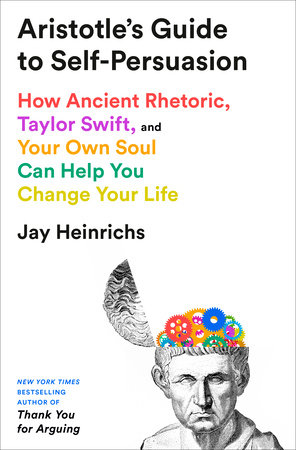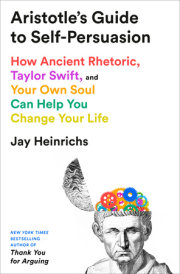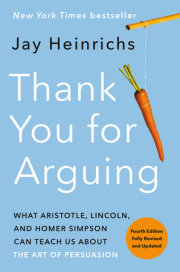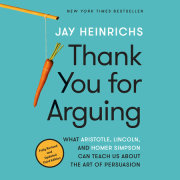“Everyone ceases to inquire how he is to act when he has brought the moving principle back to himself and to the ruling part of himself . . .” —Aristotle, Nicomachean EthicsSuccessful self-persuasion worms through the gaps in life, or closes them altogether. There’s the gap between our lust for a fresh, inviting cinnamon roll and our desire to lose a few pounds. Many of us sense a gap between the life we have grown accustomed to and the alarming changes we see around us—or within ourselves. In this chapter, Aristotle will help us deal with a more personal chasm: between your day-to-day self, the one salivating in front of that cinnamon roll, and your superior soul.
Personally, when I look in the mirror first thing in the morning, I hardly see a fine human specimen. Yet effective rhetoric depends on getting your audience to like and trust you—projecting an upstanding character, or
ethos. When that assembly consists solely of the person in the mirror, you literally face a problem. That mirror image can see right through you, flaws and past sins and all. It’s the great self-persuasion paradox: To believe in yourself, you first have to get yourself to believe in yourself. Most of the devices in this book exist to help close that gap, the one that separates our noble core from our sorry daily behavior.
Scientist that he was, Aristotle pursued the concept of the soul like a biologist studying the liver. He speculated about the various parts of the body that might contain the soul. (Many years later, the seventeenth-century philosopher and devoted Aristotelian René Descartes located the soul precisely in the pineal gland.) Aristotle went on to ask: Was the soul “the rational faculty”—or, as we moderns would say, the mind? If so, was it made of something physical, or did the soul exist beyond our own bodies, “intermingled in the whole universe”? Aristotle seemed to be enjoying himself in these speculations. The soul can’t exist everywhere, he decided, because plants do not have souls. Neither, he believed, do animals. This makes me doubt he had pets.
Therefore, Aristotle concluded, the soul had to be something human; not a physical object but a kind of spiritual spark plug, the quality of a person that senses things and responds to those sensations. The soul is the
you-ness of a person, one’s deepest identity and ultimate motive. Aristotle wrote an entire book on the soul—titled, appropriately,
On the Soul—and devoted many thousands of words in his other books to the art of bending it.
While any attempt to persuade yourself aloud can seem positively schizophrenic, the soul provides the required audience. This helps explain why some people can talk themselves into good habits and noble goals. The “themselves” they convince are their souls. In return, their souls make them better.
Modern science rarely examines the soul; but you can see traces of Aristotle in many social science experiments. The noted psychologist Elliot Aronson called self-persuasion the most effective enticement of all. Other kinds of allurements, such as advertising or political speeches, often fail to persuade because they come from an external source. We see an ad telling us to vote for someone and we ask ourselves, “Do we really want to?” With self-persuasion, Aronson said, “individuals come to believe that they really want to.” That’s because they themselves wanted to in the first place. Then what was the need for persuasion? If you want to do something, why not follow the path of almighty Nike and just do it?
You know why: Desire only gets you so far. Aronson believed that your own sense of identity will take you much farther. His research showed that
cognitive dissonance triggers self-persuasion. This is the unpleasant feeling we get when we say or do something counter to our own beliefs—“especially if this action threatens the individual’s self-concept of being a decent or rational person.”
He and a colleague conducted an experiment in which they invited volunteers to join a discussion session. First, the scientists put half the group through a rigorous initiation; the other half suffered only a mild introduction. The psychologists who led the discussion deliberately made it boring. Afterward, the volunteers who had been through the mild initiation admitted they had been bored. The ones who had been through the tough version, on the other hand, were convinced that the discussion had been fascinating. They thought of themselves as rational people. What reasonable person would deliberately go through a torturous initiation just for a pointless conversation? The experiment had caused painful cognitive dissonance in those poor volunteers.
Aristotle would have understood the phenomenon. The participants’ self-identity constituted what he called the soul. When each volunteer manipulated herself into believing that the discussion was interesting, she was trying to strike a harmonious chord with her soul.
Was this a good thing? Weren’t the volunteers simply deluding themselves?
Welcome to the dark art of rhetoric. Aristotle, the most rational of all rational beings, understood that logic rarely persuades on its own. The most powerful persuasion comes from an audience’s sense of its identity and its identification with the speaker. Any dissonance between the persuader and the audience, however logical the message, will block the persuasion. When it comes to persuading yourself, the audience is your soul. The more your daily behavior strays, the more you separate yourself from your soul’s true needs. This, Aristotle would say, is a major source of unhappiness. Your soul and your behavior fail to strike a harmonious chord. When a parent says “You’re better than this” to a naughty child, she points to what she optimistically believes to be an admirable little soul, one distinct from the kid’s abominable behavior. When Taylor Swift sings to an ex-boyfriend “It’s my turn to be me,” the “me” is her true self—as opposed to the lovesick Taylor who, as she says in the same song, “bent all my rules.” Ditto when she sings “I’m the only one of me.” Good for her. This woman is in harmony with her own soul.
Your Soul Is a ScoutThink of your soul as the you your daily you rarely lives up to. It’s the
higher you, the one that restrains itself from finishing a quart of Cherry Garcia ice cream before bed. This admirable soul of yours does not have to be sweet-smelling and beautiful. Even Aristotle, who set very high soul standards, described the best kind of soul as a sort of ancient Boy Scout. (So much for sweet-smelling.) A good soul, he said, is:
Just, treating others fairly.
Courageous, occupying the perfect middle ground between cowardice and foolhardiness.
Restrained, naturally self-disciplined. One glass of wine is enough, thank you. The perfect soul never exceeds its budget.
Magnanimous, generous toward the deserving.
Liberal, being open to those souls that are unlike itself, and looking benignly if skeptically at novelty or change.
Prudent, making the right choices to suit every occasion, without getting all emotional about it.
And, best of all, Wise. It is large. It contains multitudes of knowledge and judgment.
Such a soul may not sound like much fun at a party, let alone easy to live with. But Aristotle recognized that the actions of real human beings never perfectly reflect their souls. The characters he admired most were the tragic heroes immortalized in plays; and even these good-looking, brave types were not relatable unless they came with some serious flaws.
If you get nothing else out of this book—if you choose not to come up with a particular goal, or have no habits you wish to reset—I hope you acquire the rhetorical frame of mind that boosts your self-liking and self-trust. Your noble soul deserves this.
My own soul happens to be . . . Well, this only seems like bragging, but my soul is pretty awesome. So, by definition, is yours. But the contrast between our souls and our daily actions can seem like an abyss. My soul has all the traits of a Boy Scout: trustworthy, loyal, helpful, friendly, courteous, kind, more or less obedient, cheerful, thrifty, brave, fairly clean, and, when it isn’t making irreverent jokes, reverent. Plus: fit, athletic, good-looking, witty, brilliantly articulate, impressively knowledgeable, and ambitious for all the right reasons. That’s my soul. As for my daily self . . . sigh.
Copyright © 2025 by Jay Heinrichs. All rights reserved. No part of this excerpt may be reproduced or reprinted without permission in writing from the publisher.










